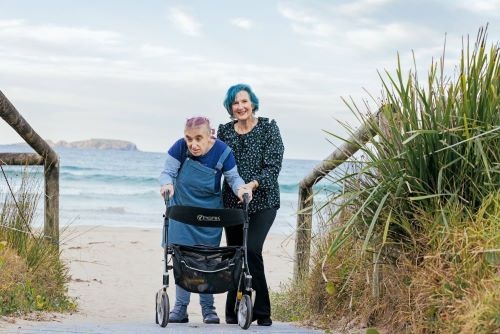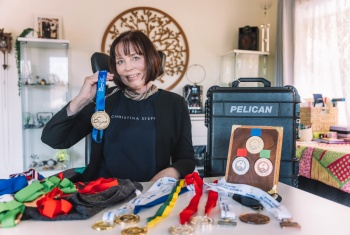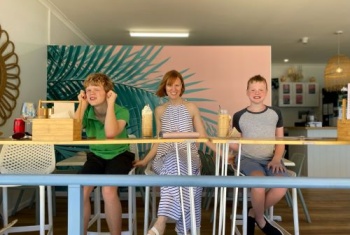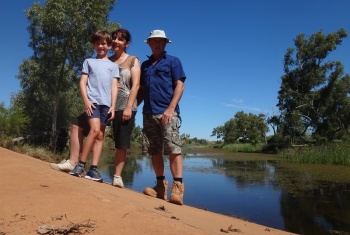When Sue Novak leaves for work these days she knows her daughter, Edie, is also leading her best life thanks to her support workers.
A NDIS participant since 2018, Edie Novak, 38, lives with Mowat-Wilson syndrome, a rare genetic disorder.
Edie, who has an intellectual disability, resides with Sue in Malua Bay, on the NSW south coast.
Her NDIS plan includes access to support workers 3 days a week, speech and exercise physiology sessions, as well as gym and massage appointments.
The support worker visits have allowed Sue to return to the workforce after a career in medical administration.
Sue now works twice a week at her local Bunnings store.
‘With Edie’s support workers there, I go to work on Tuesdays and Thursdays and just love it,’ Sue said.
‘While I’m working, Edie can go out with her support worker and participate in the community, so it’s a win-win.’
Despite being non-verbal, Edie and Sue share an unbreakable bond that transcends mere words.
‘There are other ways we communicate besides words,’ Sue said.
‘Even though Edie is completely non-verbal, she will make happy sounds, like a chuckle.
‘Edie will clap when she likes something.
'She always knows what’s going on.’
Born in Sydney, in 1984, Edie missed several development milestones and began having therapy that continued throughout her childhood.
Edie suffered seizures until her teenage years, and at the age of 21, she was diagnosed with Mowat-Wilson syndrome.
The condition is named after Dr David Mowat and Dr Meredith Wilson, who identified children with similar facial abnormalities at Sydney’s Westmead Children’s Hospital in the late 1990s.
Sue uses her administrative skills to self-manage Edie’s NDIS plan.
‘The key is self-management,’ Sue said.
‘Before, I would go through a plan manager to find out what we could do and how much it would cost.
'There’d always be delays and frustrations.
‘I thought, “I’ve done admin all my life, it can’t be that hard”.
‘The best thing about Edie’s NDIS plan is freedom and flexibility, which allows her to lead her best life.
‘At any time, I can see how much funding Edie’s got.
'We’re given a budget and we make that work.
‘Self-management cuts out the middleman and gives ownership back to the carer and person with a disability.
'I’m so grateful to the Australian taxpayers, who make the NDIS possible.’
Under her NDIS plan, Edie spends Tuesdays, Thursdays and Fridays with her support workers, participating in social outings around town, where she is well known.
She also spends 2 days a week in supported employment.
‘There’s nothing Edie won’t be involved in,’ Sue said.
‘More people know Edie in town than know me.
‘We’d forget our companion card at the cinemas and the staff would say “don’t you worry, we know you, Edie”.
‘How beautiful is that.’
Sue says Edie’s NDIS plan has been life changing.
It has allowed the pair to live their best lives.
‘For people who don’t understand, just walk one day in my life and see the difference the NDIS has made,’ Sue said.
‘It goes from a parent and disabled child sitting at home staring at one another, to both of us contributing to society.
‘Edie’s contributing, people are employed.
‘I’m contributing, I’ve got employment and I am grateful.
‘I always like to think that, together, there’s nothing we cannot do.
‘She makes people smile and laugh.
‘She’s such a joy to be around.
‘I wish for Edie to keep on living her best life and to be happy.
‘I cannot ever imagine not having her with me.
‘One day, I’d like her to say, “hey mum, I love you”.
‘But I already know she does.’



